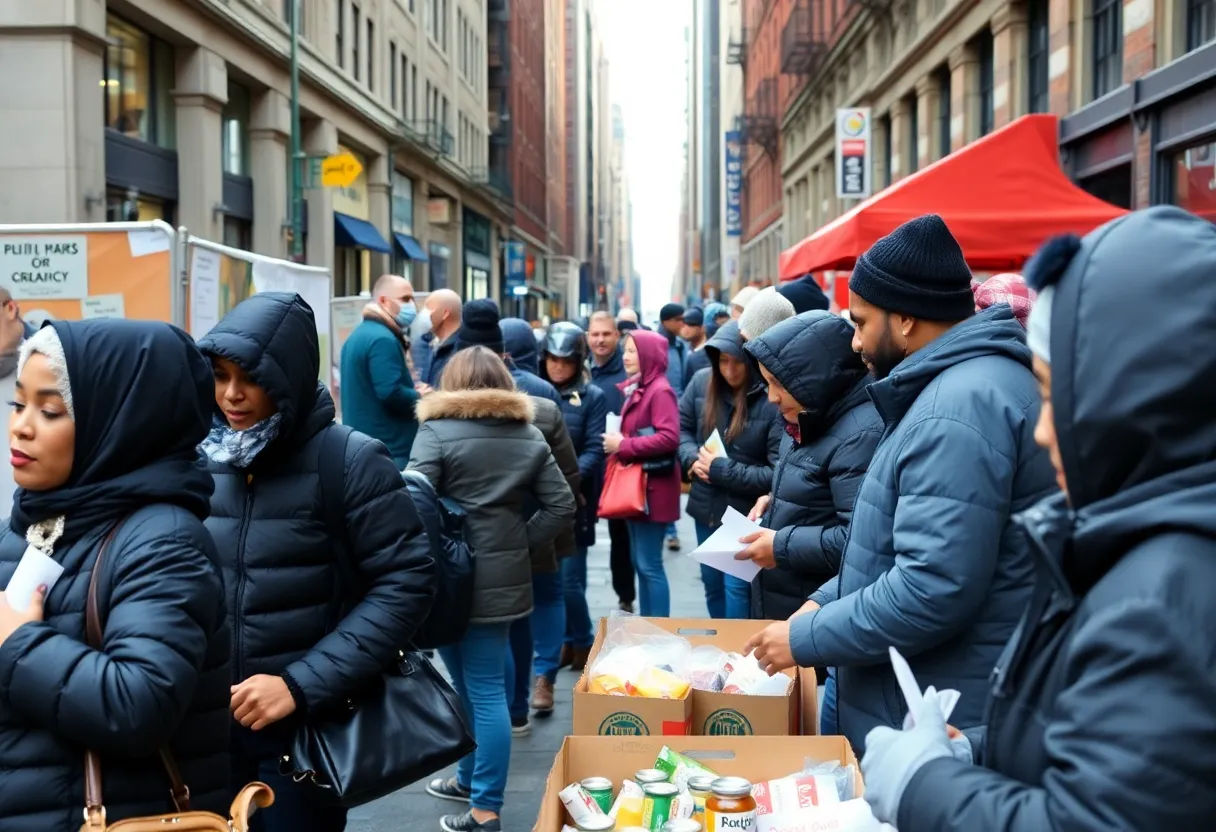News Summary
New York is facing significant changes to its Supplemental Nutrition Assistance Program (SNAP), with hundreds of thousands potentially losing benefits in November due to stricter work requirements imposed by the Trump administration. A recent federal directive has accelerated these work requirements, compelling adults aged 18 to 54 without dependents to prove active employment or face reduced benefits. Local agencies are scrambling to manage the forthcoming impact, with concerns about funding and resources exacerbated by government shutdown threats. Activists urge lawmakers to protect vulnerable residents amidst these challenges.
New York is facing significant changes to its food assistance program, with hundreds of thousands of residents potentially losing benefits as early as November due to a surprise announcement by the Trump administration. In July, President Trump signed a law that cut more than $1 trillion from Medicaid and the Supplemental Nutrition Assistance Program (SNAP), which introduced stricter work requirements expected to adversely affect many recipients next year.
On October 3, the federal agency responsible for overseeing SNAP made an unexpected move by accelerating the implementation timeline for these work requirements. This decision includes terminating waivers that allowed states like New York to suspend work obligations for able-bodied adults. Initially, New York’s waiver was set to end in February, but it is now scheduled to be canceled in early November.
Under the new requirements, adults aged 18 to 54 without dependents will only receive three months of benefits over three years unless they prove 80 hours of work, volunteering, or attending educational programs each month. This change is likely to lead to a significant rise in the number of recipients losing their eligibility. Research suggests that such work requirements do not necessarily lead to increased employment rates. They can often result in eligible recipients unintentionally losing their benefits due to administrative errors.
County social service departments throughout New York, already challenged by limited resources, are now required to prepare quickly for the changes to SNAP. The Greene County social services commissioner has begun brainstorming strategies to manage the anticipated impact, while the Oswego County administrator noted that staffing will need to increase to cope with the new regulations.
In line with the federal directive, the New York State Office of Temporary and Disability Assistance has instructed counties to enforce these work rules starting next month. These requirements will eventually extend to adults up to age 64 without dependents during their SNAP benefit renewals.
As counties brace for the new workload, they will need to reallocate resources and may incur increased costs due to overtime to accommodate the new rules. Furthermore, the federal legislation has cut administrative funding for SNAP, compelling states to cover part of the costs associated with the benefits.
In addition, ongoing government shutdowns pose a further threat to SNAP funding. If Congress does not reopen the government soon, funding for all SNAP and Women, Infants, and Children (WIC) recipients could be suspended. Food banks across the state are also at risk of disruption, as they rely on federal funding and shipments that have declined due to previous federal cuts.
Currently, nearly 3 million New Yorkers are enrolled in SNAP, receiving an average monthly benefit of $376. Approximately half a million individuals benefit from WIC, which provides nutritional assistance to pregnant women, new mothers, and young children. While state Health Department officials have confirmed that existing WIC and SNAP benefits will remain unaffected through October, the future status of these programs is uncertain.
Activists are urging New York lawmakers to take action to safeguard residents at risk of losing their SNAP benefits. There are proposals on the table advocating for tax increases on the wealthy to help fund these support programs. Many families are voicing concerns about their ability to navigate the new paperwork and work requirements necessary to continue receiving assistance.
Additionally, New York has been grappling with issues related to SNAP skimming, and currently, there is no reimbursement available for stolen benefits. This situation has exacerbated the struggles faced by numerous families experiencing hunger. Although the state previously benefited from a waiver that exempted many individuals from work requirements, the upcoming regulations will necessitate that more people document their work activities, all while food insecurity continues to grow.
Deeper Dive: News & Info About This Topic
- New York Focus
- Newsweek
- WGRZ
- Wikipedia: Supplemental Nutrition Assistance Program
- El Adelantado
- Encyclopedia Britannica: Food Assistance

Author: STAFF HERE NEW YORK WRITER
The NEW YORK STAFF WRITER represents the experienced team at HERENewYork.com, your go-to source for actionable local news and information in New York, the five boroughs, and beyond. Specializing in "news you can use," we cover essential topics like product reviews for personal and business needs, local business directories, politics, real estate trends, neighborhood insights, and state news affecting the area—with deep expertise drawn from years of dedicated reporting and strong community input, including local press releases and business updates. We deliver top reporting on high-value events such as New York Fashion Week, Macy's Thanksgiving Day Parade, and Tribeca Film Festival. Our coverage extends to key organizations like the Greater New York Chamber of Commerce and United Way of New York, plus leading businesses in finance and media that power the local economy such as JPMorgan Chase, Goldman Sachs, and Bloomberg. As part of the broader HERE network, including HEREBuffalo.com, we provide comprehensive, credible insights into New York's dynamic landscape.





